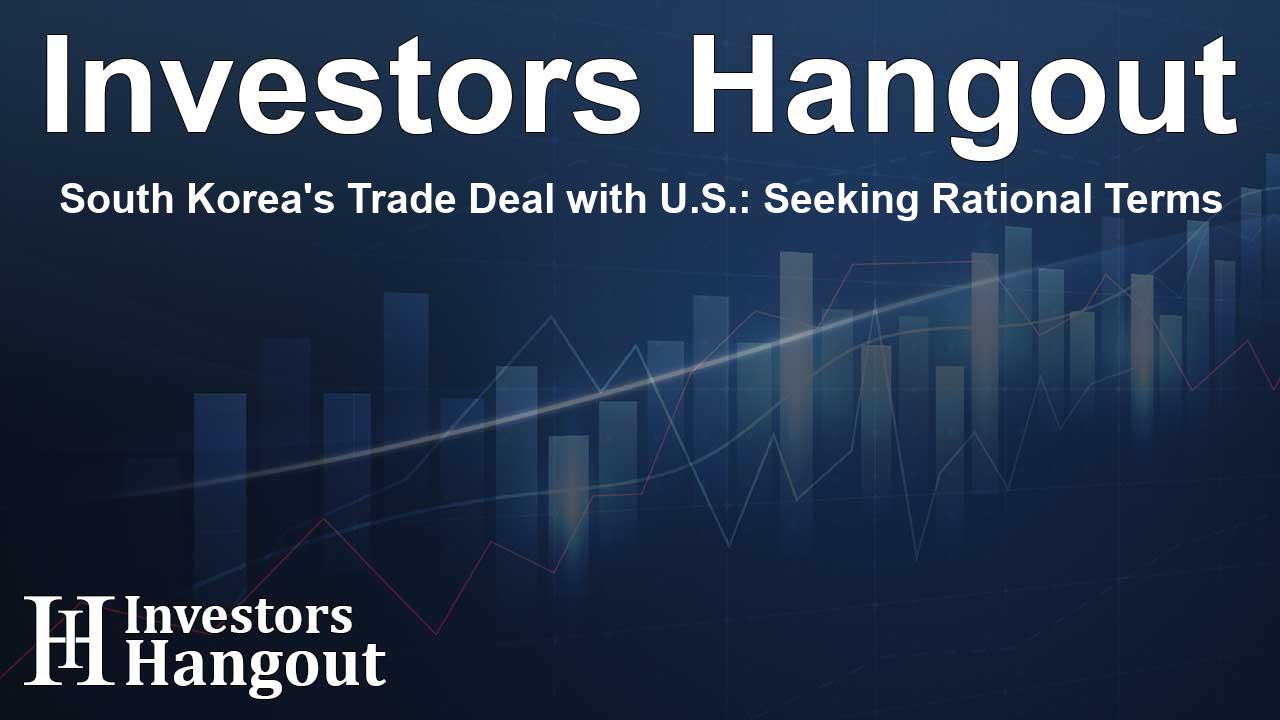South Korea's Trade Deal with U.S.: Seeking Rational Terms

South Korea's Trade Deal Approaches Negotiation Hurdles
In the world of international trade, negotiations can swing between promise and peril. Recently, the South Korean President Lee Jae Myung has raised significant concerns regarding a proposed trade deal with the United States, valued at $350 billion. This deal, originally discussed with former President Donald Trump, is now at a crossroads. Lee emphasizes that any final agreement needs to be 'commercially rational' and beneficial for both nations.
Commercial Rationality as a Priority
During a recent meeting with U.S. Treasury Secretary Scott Bessent at the United Nations General Assembly, discussions revolved around the investment framework intended to improve economic ties. The South Korean administration stresses the importance of aligning this agreement with fair commercial practices that acknowledge the interests of both parties.
Details of the Investment Proposal
President Lee's chief policy secretary, Kim Yong-beom, highlighted that the massive investment proposal was tentatively agreed upon by Lee and Trump earlier this year. This package aims to not only attract investment but also to adjust trade balances, especially regarding tariffs affecting South Korean exports. Although the expectations are high, Lee's administration is wary of the deal's implications for economic stability.
Currency Concerns Arise
Adding to the complexity of the situation, Minister Koo Yun-cheol, who accompanied Lee, voiced apprehensions regarding the scale of investment and its repercussions on South Korea's currency reserves. This cautious outlook is linked to historical fears of financial instability similar to the Asian Financial Crisis of 1997.
Warnings of Financial Crisis
In a statement earlier this week, President Lee cautioned that Trump's considerable demand for investment could potentially lead to a financial crisis akin to that of 1997. He raised alarms about withdrawing a hefty amount of $350 billion, as such a maneuver could destabilize the economy significantly. Without safeguards such as a currency swap with the United States, South Korea could face dire financial challenges.
Need for a Currency Swap Agreement
Kim has reiterated the necessity for a foreign exchange swap agreement, which would include an unlimited credit line from the U.S. This arrangement is deemed crucial for supporting any final deal, thereby providing a buffer against sudden financial fluctuations. South Korean officials have reported that Washington is currently examining the proposal for such an arrangement.
Market Reaction to the Negotiation Status
As discussions unfold, the South Korean Won has reacted to the economic climate, breaking a key psychological barrier, hitting 1,405.7 against the U.S. Dollar before stabilizing around 1,401.4. This fluctuation highlights the prevailing economic concerns and reflects the uncertainty surrounding the trade negotiations.
The Path Forward for Trade Discussions
As the talks progress, the outcome will depend heavily on the willingness of both nations to find common ground, particularly around tariff modifications and appropriate investment levels that ensure economic stability. The South Korean government is poised to take a cautious yet optimistic approach, hoping for a resolution that aligns with the principles of fair trade.
Frequently Asked Questions
What is the proposed trade agreement between South Korea and the U.S.?
The proposed trade agreement is valued at $350 billion and focuses on investment and tariff adjustments to benefit both countries.
Why is President Lee emphasizing 'commercially rational' terms?
President Lee advocates for terms that are fair and reflect mutual benefits, aiming for a balanced approach to international relations with the U.S.
What are the concerns regarding the currency swap?
Concerns revolve around potential financial instability if a large investment is made without protective measures like a currency swap with the U.S.
How has the South Korean Won reacted to these negotiations?
The Won experienced fluctuations, reaching levels not seen since mid-May, reflecting the anxiety over the ongoing negotiations.
What role does the U.S. Treasury Secretary play in these discussions?
The U.S. Treasury Secretary is integral in facilitating talks and clarifying investment terms, ensuring both nations work towards a beneficial agreement.
About The Author
Contact Ryan Hughes privately here. Or send an email with ATTN: Ryan Hughes as the subject to contact@investorshangout.com.
About Investors Hangout
Investors Hangout is a leading online stock forum for financial discussion and learning, offering a wide range of free tools and resources. It draws in traders of all levels, who exchange market knowledge, investigate trading tactics, and keep an eye on industry developments in real time. Featuring financial articles, stock message boards, quotes, charts, company profiles, and live news updates. Through cooperative learning and a wealth of informational resources, it helps users from novices creating their first portfolios to experts honing their techniques. Join Investors Hangout today: https://investorshangout.com/
The content of this article is based on factual, publicly available information and does not represent legal, financial, or investment advice. Investors Hangout does not offer financial advice, and the author is not a licensed financial advisor. Consult a qualified advisor before making any financial or investment decisions based on this article. This article should not be considered advice to purchase, sell, or hold any securities or other investments. If any of the material provided here is inaccurate, please contact us for corrections.
